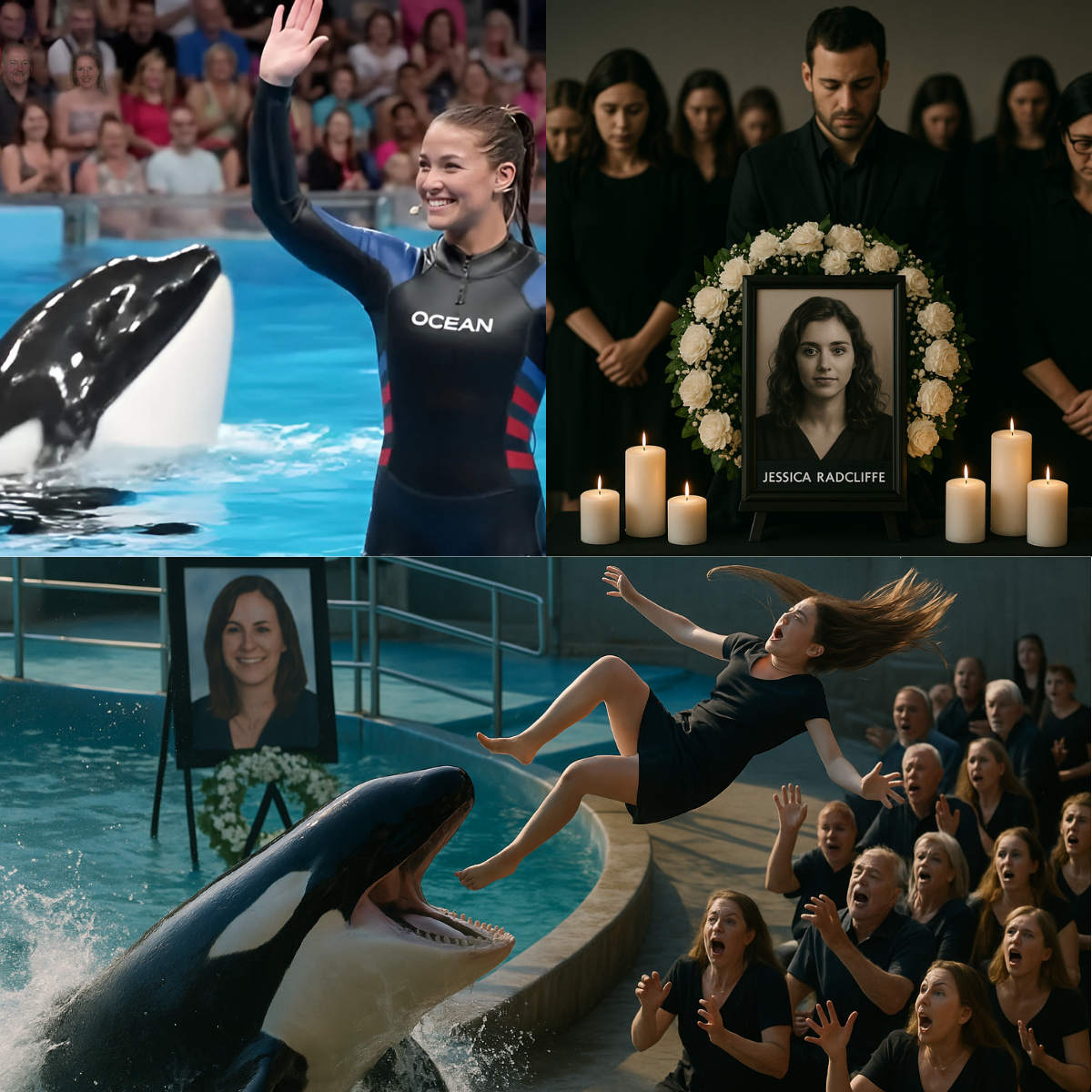
What was meant to be a solemn and heart-wrenching farewell for Jessica Radcliffe, the celebrated marine trainer whose bond with killer whales had captured public imagination, spiraled into chaos and horror in a moment no one could have foreseen. The memorial, staged at the very aquatic park where she had spent years of her life working with these powerful animals, had drawn friends, family, colleagues, and hundreds of supporters who came to pay their respects. Photographs of Radcliffe’s smiling face played across giant screens, her colleagues shared moving tributes, and her young daughter stood near the platform where her mother had once commanded the crowd’s admiration. It was a memorial meant to heal, to honor, and to remember. But in one sudden and terrifying instant, grief turned into pandemonium.
The centerpiece of the memorial was to be a symbolic routine performed by the killer whale Radcliffe had trained and worked alongside for more than a decade. Staff described the display as gentle, a final farewell from the animal to the trainer it had known so intimately. Trainers guided the whale into the pool for a slow, sweeping circle, its massive body gliding gracefully through the water as the audience applauded softly. The air was thick with emotion, with many in the crowd reduced to tears at the sight of the animal bowing its head toward the giant image of Radcliffe projected on the wall. It was meant to be a poignant gesture of respect, but what followed shocked everyone present.
Without warning, the whale surged forward with explosive force, lunging toward the platform where Radcliffe’s daughter stood. Witnesses gasped as the massive creature’s head slammed against the edge, sending a violent spray of water over the mourners. In the chaos, the child was struck and hurled into the crowd, her scream piercing the stunned silence before she landed among the front rows. Panic erupted instantly. People screamed and scrambled, some trying to help the girl, others rushing away in terror as trainers shouted commands and frantically signaled to subdue the agitated animal. The serene tribute had in an instant become a nightmare unfolding in front of hundreds of horrified eyes.
Paramedics, stationed nearby as a precaution, rushed forward and lifted the young girl away as family members cried out in shock. Though injured, she was conscious, and her cries mingled with the chaos as she was rushed toward waiting ambulances. The whale, meanwhile, was wrestled back under control by handlers, but the damage was done. What was supposed to be a memorial of closure had been transformed into a traumatic spectacle, with the image of a grieving animal’s violent lunge forever imprinted on the minds of those who had gathered to say goodbye.
Experts have already begun speculating on what might have triggered the unexpected attack. Some suggest the whale, sensitive to the strange atmosphere and absence of its trainer, may have been agitated by the noise of the crowd or confused by the ceremony. Others point to the possibility of stress, noting that even the most carefully trained marine animals remain wild at heart, unpredictable and immensely powerful. The incident has reignited the longstanding debate over keeping such creatures in captivity, a debate Radcliffe herself had lived at the center of, balancing her love for the animals with criticism from activists who argued their confinement was inherently dangerous and cruel.
For Radcliffe’s family, the horror was unbearable. To lose a mother and then see her child nearly crushed at the very ceremony meant to honor her was a cruelty no words could capture. Friends and colleagues who had come to celebrate her life were left shaken, some in tears, others in disbelief that the animal she had loved so deeply could be the cause of fresh suffering for the people she left behind. Mourners who had traveled from far and wide expecting to take part in a gentle farewell instead found themselves reliving the trainer’s tragic fate in a cruel and symbolic twist of irony.
Authorities immediately launched an investigation into the incident, examining whether safety protocols had been properly observed and questioning the decision to involve the whale at all in such an emotionally charged event. Critics argue that inviting the animal to participate was reckless, a decision made for spectacle rather than sensitivity, and one that placed Radcliffe’s daughter and the crowd at unnecessary risk. The park now faces intense scrutiny, with calls for it to close entirely or release its remaining animals to sanctuaries. Footage of the memorial, captured on cell phones, has already gone viral, igniting outrage and sparking global conversation about the dangers of blending grief, performance, and wild creatures.
What remains is a day meant to honor a woman’s love for animals but remembered instead as one of chaos and horror. The legacy of Jessica Radcliffe, a trainer who spent her life nurturing a bond between humans and one of the ocean’s most formidable predators, has now been tragically shadowed by the violent outburst of that very bond. For those present, the memory will never fade: a grieving family, a lunging whale, a child hurled into a stunned and screaming crowd. And for the world watching, it is a haunting reminder that no matter how deep the trust, the wild cannot be tamed, and sorrow can turn to terror in the blink of an eye.

